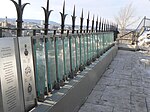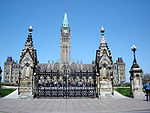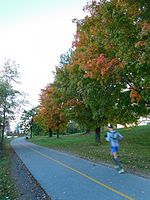Library of Parliament

The Library of Parliament (French: Bibliothèque du Parlement) is the main information repository and research resource for the Parliament of Canada. The main branch of the library sits at the rear of the Centre Block on Parliament Hill in Ottawa, Ontario. The library survived the 1916 fire that destroyed Centre Block. The library has been augmented and renovated several times since its construction in 1876, the last between 2002 and 2006, though the form and decor remain essentially authentic. The building today serves as a Canadian icon, and appears on the obverse of the Canadian ten-dollar bill. The library is overseen by the Parliamentary Librarian of Canada and an associate or assistant librarian. The Canadian Parliamentary Poet Laureate is considered to be an officer of the library.
Excerpt from the Wikipedia article Library of Parliament (License: CC BY-SA 3.0, Authors, Images).Library of Parliament
Parliament Road, (Old) Ottawa Centretown
Geographical coordinates (GPS) Address Website External links Nearby Places Show on map
Geographical coordinates (GPS)
| Latitude | Longitude |
|---|---|
| N 45.425466 ° | E -75.700296 ° |
Address
Library of Parliament
Parliament Road
K1A 0A3 (Old) Ottawa, Centretown
Ontario, Canada
Open on Google Maps








